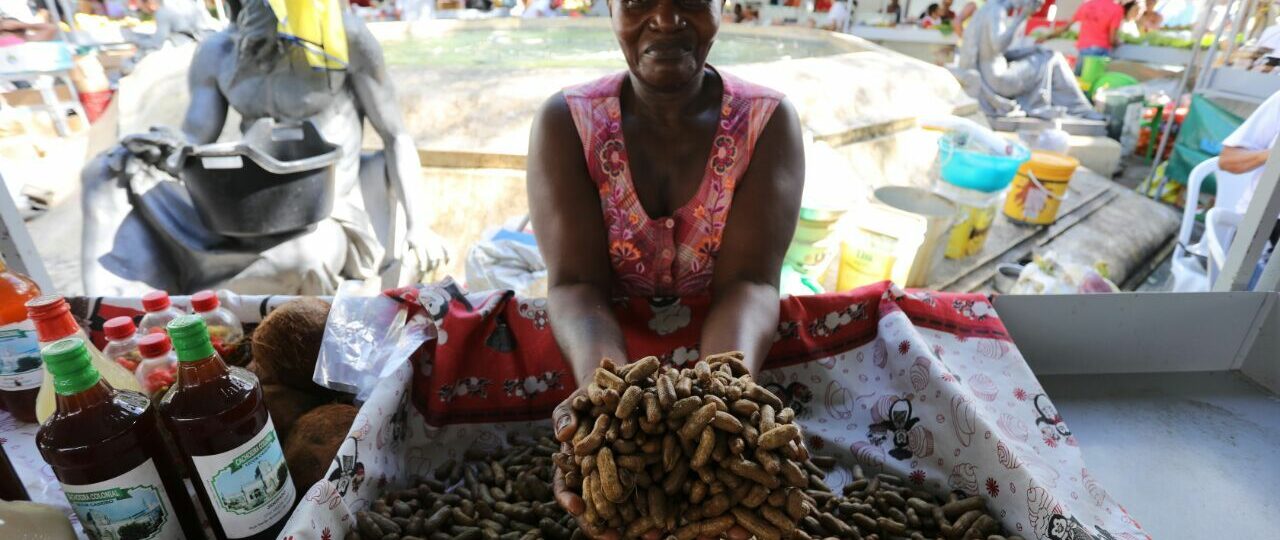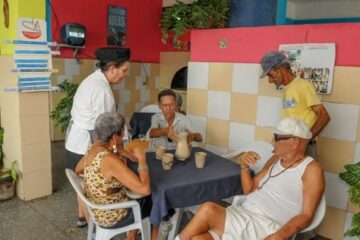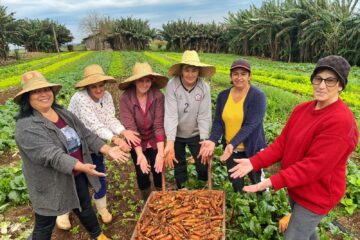“With conviction, we open the way to popular peasant feminism, we build food sovereignty, and we struggle against the crisis and violence.” We unite through this strong, powerful motto, which represents us as La Via Campesina women. With it, we underscore a commitment for the years to come.
From our territories, we have been waging a struggle against capitalism, patriarchy, racism, and rising fascism. In our joint organizing efforts as women, we have experienced a process of years coordinating our demands, actions, and organization. Our sisters are women whose process is not only based on theory, but also practices.
To achieve food sovereignty, we must address women’s role and impact. The preparations for our 6th Women’s Assembly of La Via Campesina are an opportunity to strengthen our shared vision. Along the way, we look for new solutions for the concepts we know, as well as for proposals and demands that emerge from the territories.
Women’s Assembly, a Space Advancing Our Organization
At the Assembly, we, women from around the world, come together with diversity, becoming sisters. Sisters from other continents feel closer to us when we address all our problems and and our experiences of struggle. We make history. And history always brings us to the present, so that we can anticipate the next step we will take.
We have created a mística of women’s work and peasant life that transcends barriers and will be seen at the Assembly, where we will talk about the history of La Via Campesina, the relationship with ally organizations, the presence and struggle of peasant women in the international context and in each region.
How are we going to promote our work at the Assemby? What will be our contributions and initiatives? In this sense, it is important to work on our memory. We have more than 30 years of accumulated experience. In 1989, for example, we attended the assembly to organize the meeting around the anniversary of 500 years of the invasion of America, and a strong voice rose from Latin America, arguing that, from our roots, we must discover ourselves, not to look at the present with optimism, but to face it with great determination.
Important campaigns in La Via Campesina emerged from our proposals: for seeds, to fight violence against women, against pesticides. Now, this upcoming Conference and Assembly must be a boost for our future actions, deepening the building of popular peasant feminism and strengthening mobilization and solidarity on a global level.
Current Situation for Women
One of the great troubles disturbing our continent and the world today is the rebirth of fascism. We must be alert, sharpen the struggle, and continue to build ideas. Fascism is overwhelming our people with fear, but we keep going fearlessly, with great hope. We must continue to make our dreams come true.
COVID-19 is a result of the systemic productive forms of capital and has exposed the seriousness of the world crisis. We were staying at home, but we were not in silence. During that time, we have accumulated great experience and reestablished bonds between rural and urban areas.
We struggle for food sovereignty, not only for peasant agriculture to continue to produce food—that is our responsibility—, but to ensure a fundamental human right, which is to ensure food to the peoples of the world.
As the Latin American Coordination of Rural Organizations (CLOC-La Via Campesina), we have been contributing by strengthening the international coordination with jointly organized regional processes, as well as by strengthening the feminist agendas that call us, like March 8th and November 25th.
We want to move forward in political education processes across all levels of our movement. Political education helps us understand the bases of oppression and violence, to build strategies to overcome them. We want to educate educators, exchange ways of struggling and organize regionally, as well as strengthen our communication tools, which are essential to promote our processes and struggles, especially with the participation of young women from different regions.
Popular Peasant Feminism
Right now we have a new scenario for the development of the feminist movement, which raises some questions. Feminism in these times has emerged very strongly and hopefully, while also under a daunting methodology in certain senses and sectors. Our feminism, as we have said since the beginning, is a class-based feminism, within a political framework that aims to build socialism.
In Latin America, our proposal comes from the principles of the history of our movement. We used to say “there is no socialism without feminism.” But we have grown and matured, considering that our challenges in each moment must turn into positive action. As we have moved forward in this conversation, now we say, “with feminism, we will build socialism.”
This advance is the political empowerment of peasant, Indigenous, and Black women in our member organizations. We are sure that changes will only be possible when we raise the level of collective awareness and organizing. We take significant measures to underscore that we are struggling for power. It is extremely important that women take part in decision-making processes and the execution of more decisive public policy actions, making what is addressed in the United Nations Declaration on the Rights of Peasants (UNDROP) a reality.
The Declaration points to a feminist perspective, according to which it is not possible to move forward without women’s full participation. In our history, we have demanded gender parity, which is not “50-50,” but rather responsibility, pathways shared in the struggle, and political movement building at the same time. We are not—each of us—”just another one”; we are the voice of all other women we represent in these political forums.
We, women, show our strength: yes, we are a political construct; we are an advance in the peasant struggle; and we have been guiding La Via Campesina’s actions.
We have addressed territories in key issues. We have argued that food sovereignty has allowed us to reclaim our identity. And we have struggled relentlessly for food sovereignty, centering around women’s knowledge, experience, and wisdom. We have to engage in a strong women’s offensive in the most relevant spaces of power, aiming to use our main tool for the battle, which is the Declaration.
We have started to legitimize a feminism from our struggle, identity, proposals, and demands. This feminism needs to be extensively addressed with our male comrades, in each of our territories. We will make our motto a reality.

Alicia Amarilla lives in Paraguay; Elsa Sánchez lives in the Dominican Republic; María Canil lives in Guatemala; and Pancha Rodríguez lives in Chile. They are part of the women’s platform of the Latin American Coordination of Rural Organizations (CLOC-La Via Campesina). This is an edited version of their interventions during the virtual workshop “Building food sovereignty and popular peasant feminism,” held in September 2023, as part of the preparations for the 6th Women’s Assembly of La Via Campesina, which will be held on December 2nd, 2023 in Bogota, Colombia. The conference will then be held before the 8th International LVC Conference, which will take place in December 1-8.




